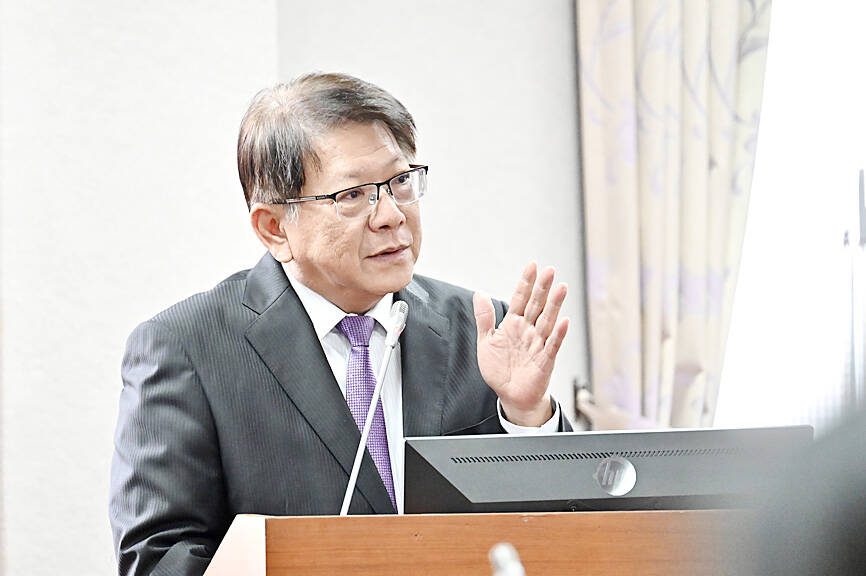President William Lai (賴清德) is to promulgate controversial laws passed by the Legislative Yuan last week, Presidential Office Secretary-General Pan Men-an (潘孟安) said yesterday.
The legislature approved amendments to the Constitutional Court Procedure Act (憲法訴訟法), the Public Officials Election and Recall Act (公職人員選舉罷免法) and the Act Governing the Allocation of Government Revenues and Expenditures (財政收支劃分法) on Friday last week.
Some have suggested that Lai could refuse to promulgate the laws, or that Premier Cho Jung-tai (卓榮泰) could refuse to countersign them, but Pan confirmed that both men would uphold the Constitution.

Photo: George Tsorng, Taipei Times
Asked what the president meant when he said “democratic disputes should be resolved with even greater democracy,” Pan said that Lai did not imply he would organize a referendum.
Instead, the government would consider all its options, such as the Cabinet requesting the legislature reconsider the amendments or petitioning the Constitutional Court to rule on their constitutionality, he said, adding that refusing to promulgate the bills is not an option.
The Executive Yuan has so far only received the amendments to the Constitutional Court Act, Cabinet spokeswoman Michelle Lee (李慧芝) said.
Once all three are received, the Cabinet would exercise its power to consider relief measures prior to the deadline on Thursday next week for the laws to be promulgated, Lee said.
The laws severely impact the administration’s ability to govern, including subsequent budgets and salary increases, and there is a high likelihood of the Cabinet filing an objection, she added.
The amendments to the Act Governing the Allocation of Government Revenues and Expenditures would result in a NT$375.3 billion (US$11.48 billion) reduction of the central government’s budget, the Directorate-General of Budget, Accounting and Statistics said.
The allocation of government revenue could reduce the defense budget by up to 28 percent, equivalent to about NT$80 billion, the Ministry of National Defense said on Wednesday.
The ministry crafted a budget based on its duty to safeguard the country and its operational needs, Deputy Minister of National Defense Hsu Yen-pu (徐衍璞) said yesterday.
If the proposed budget is not fully funded, it could affect the ministry’s plans to raise salaries for personnel, as well as other necessary projects such as Taiwan’s domestic submarine, Hsu said.
The budget cuts would have a “clear” impact on Taiwan’s diplomacy, Minister of Foreign Affairs Lin Chia-lung (林佳龍) said.
A 28 percent reduction for the Ministry of Foreign Affairs would be NT$6.5 billion, affecting the ministry’s exchanges with international organizations and allies, including embassy operations, Lin said.
Democratic Progressive Party caucus whip Ker Chien-ming (柯建銘) said the party would “exhaust” all its constitutional options in opposing the new bills, including requesting the Constitutional Court to provide an interpretation.
Additional reporting by CNA and Reuters

DEFENSE: The National Security Bureau promised to expand communication and intelligence cooperation with global partners and enhance its strategic analytical skills China has not only increased military exercises and “gray zone” tactics against Taiwan this year, but also continues to recruit military personnel for espionage, the National Security Bureau (NSB) said yesterday in a report to the Legislative Yuan. The bureau submitted the report ahead of NSB Director-General Tsai Ming-yen’s (蔡明彥) appearance before the Foreign and National Defense Committee today. Last year, the Chinese People’s Liberation Army (PLA) conducted “Joint Sword-2024A and B” military exercises targeting Taiwan and carried out 40 combat readiness patrols, the bureau said. In addition, Chinese military aircraft entered Taiwan’s airspace 3,070 times last year, up about

The Overseas Community Affairs Council (OCAC) yesterday announced a fundraising campaign to support survivors of the magnitude 7.7 earthquake that struck Myanmar on March 28, with two prayer events scheduled in Taipei and Taichung later this week. “While initial rescue operations have concluded [in Myanmar], many survivors are now facing increasingly difficult living conditions,” OCAC Minister Hsu Chia-ching (徐佳青) told a news conference in Taipei. The fundraising campaign, which runs through May 31, is focused on supporting the reconstruction of damaged overseas compatriot schools, assisting students from Myanmar in Taiwan, and providing essential items, such as drinking water, food and medical supplies,

A magnitude 4.3 earthquake struck eastern Taiwan's Hualien County at 8:31am today, according to the Central Weather Administration (CWA). The epicenter of the temblor was located in Hualien County, about 70.3 kilometers south southwest of Hualien County Hall, at a depth of 23.2km, according to the administration. There were no immediate reports of damage resulting from the quake. The earthquake's intensity, which gauges the actual effect of a temblor, was highest in Taitung County, where it measured 3 on Taiwan's 7-tier intensity scale. The quake also measured an intensity of 2 in Hualien and Nantou counties, the CWA said.

New Party Deputy Secretary-General You Chih-pin (游智彬) this morning went to the National Immigration Agency (NIA) to “turn himself in” after being notified that he had failed to provide proof of having renounced his Chinese household registration. He was one of more than 10,000 naturalized Taiwanese citizens from China who were informed by the NIA that their Taiwanese citizenship might be revoked if they fail to provide the proof in three months, people familiar with the matter said. You said he has proof that he had renounced his Chinese household registration and demanded the NIA provide proof that he still had Chinese